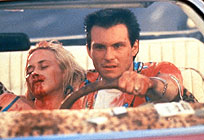|
|
|
|
True Romance
|
 |
|
Writer,
director and enfant terrible Quentin Tarantino has told the world perhaps far
too clearly what his movies are all about.
From his
scripts for Tony Scott's True Romance and Oliver Stone's Natural Born Killers (1994) to his own films Reservoir Dogs (1992) and Pulp Fiction (1994), Tarantino
claims that his work celebrates violence – not real violence but movie
violence, violence as fun, fantasy, catharsis and dramatic metaphor.
This is not
a new provocation within popular culture. And True Romance – which is a far less interesting film than Reservoir Dogs – shows how such a stance
can become merely flip and empty when repeated ad nauseum on screen. Clarence
(Christian Slater) is a normal guy leading an uneventful life until
True Romance is a veritable cartoon which
shamelessly indulges the adolescent fantasy encapsulated years ago by Jean-Luc Godard:
"All you need to make a film is a girl and a gun". The film's violent
scenes, some of them prolonged and brutal, have no connection whatsoever with
the social stresses and strains of the real world. This disconnection is itself
interesting: Tarantino, like Scorsese in The King of Comedy (1982) or Jim McBride in Breathless (1983), offers us a hero whose relation to life is entirely mediated through an
almost psychotic identification with pop culture, especially icons like Elvis.
Where
Tarantino directs his own material in a daringly sparse and brutally logical
manner, Scott gives this film a flashy, fragmented surface, as if he were
zapping between TV stations. Some of the fragments are arresting, such as the
scene where Clarence's father (Dennis Hopper) offers an inspired history
lecture to a sadistic hitman (Christopher Walken).
In scenes
like this, Tarantino is obviously aiming for a real moment of truth – true
romance or true violence – that could somehow put into perspective all the
posturing, quoting and dreaming that determine his droll, postmodern
sensibility. He should have studied Terrence Malick's classic
MORE Scott: Crimson Tide, Domino, The Fan, Man on Fire © Adrian Martin June 1994 |
![]()